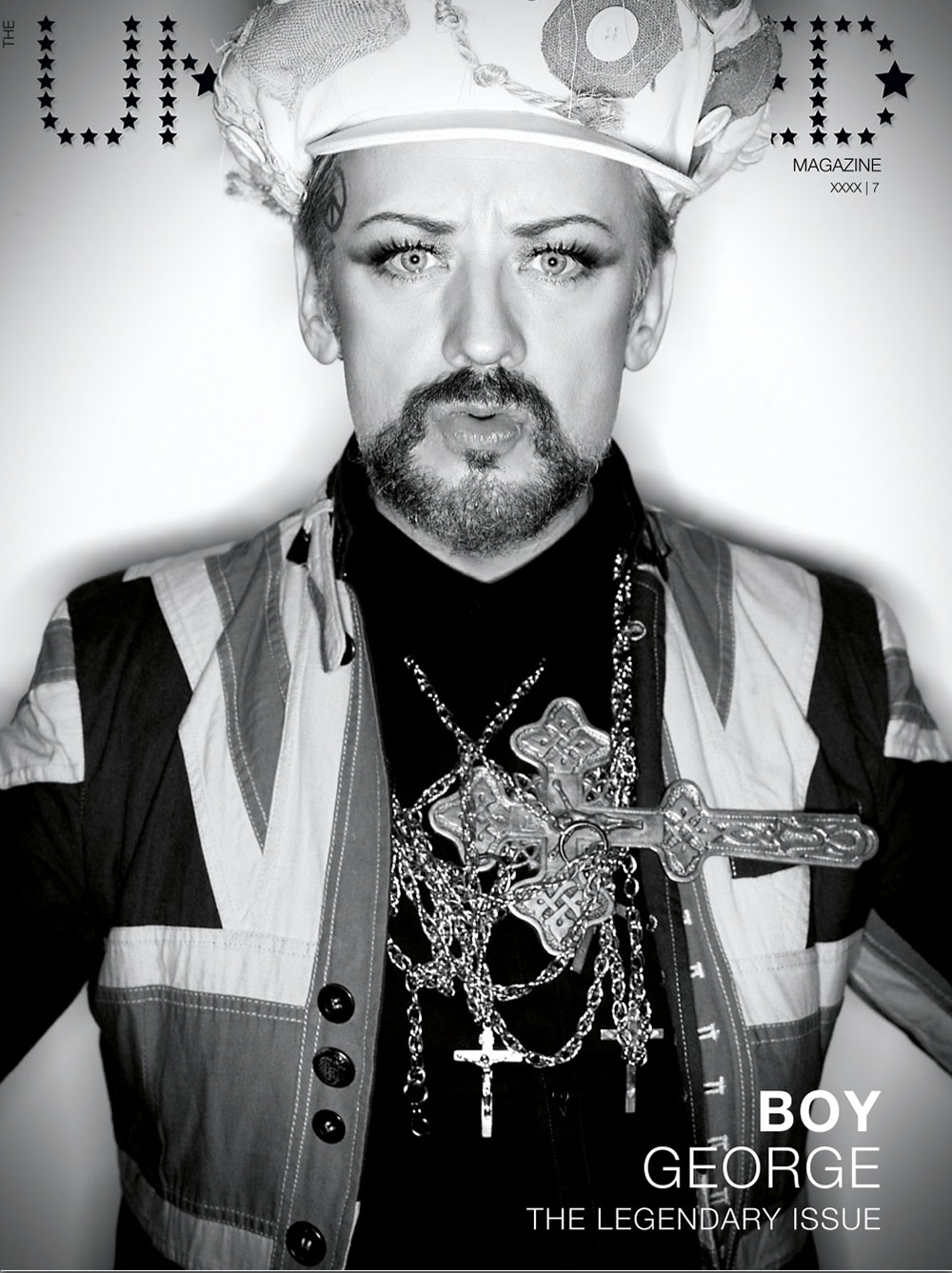
Very few figures have held a tighter grip on an entire generation of pop culture devotees more readily than Boy George. The Culture Club frontman became the face of the 1980s, largely by subverting what the mainstream had come to expect from their pop stars. In an era coming off the high of disco and the underground rebellious culture of punk, Boy George represented a new wave of musician: loud, colorful, brash, and uniquely unafraid to ruffle a few feathers. The openly gay singer became an immediate icon. His group, Culture Club, became the first cross-genre multi-racial band to hit the mainstream, as well as the first group to rival The Beatles with the most top-ten singles from a debut album. Hit songs such as “Karma Chameleon” remain staple tracks from the 80s that still get radio play today, and at the time, propelled them to the forefront of the music scene as international pop stars. In 1984, Culture Club won the Grammy for Best New Artist, as well as two Brit Awards for Best British Group, and Best British Single. Now, 30 years later, Culture Club have announced the release of a new album, which is slated for early 2015.
After performing new material — including their new single “More Than Silence” — at The Los Angeles County Museum of Art for their fourth annual Art+Film Gala in November 2014, Culture Club had plans on touring in North America and the UK. Unfortunately, due to a polyp found in Boy George’s throat, the tour is currently canceled until further notice. However, the band announced that they will play on 7/24 at The Greek Theater in LA, and recently released a documentary via BBC, titled Karma To Calamity, which follows Culture Club throughout their reunion and subsequent writing of the new album.
The Untitled Magazine caught up with the legendary musician while he was in New York for a candid interview and photo shoot for The “Legendary” Issue 7. Check out the full-length interview below, and make sure not to miss the full 6-page story, available now on newsstands in 30 countries. Visit our online store to buy your copy, or download the free “Legendary” Issue App on iTunes now!
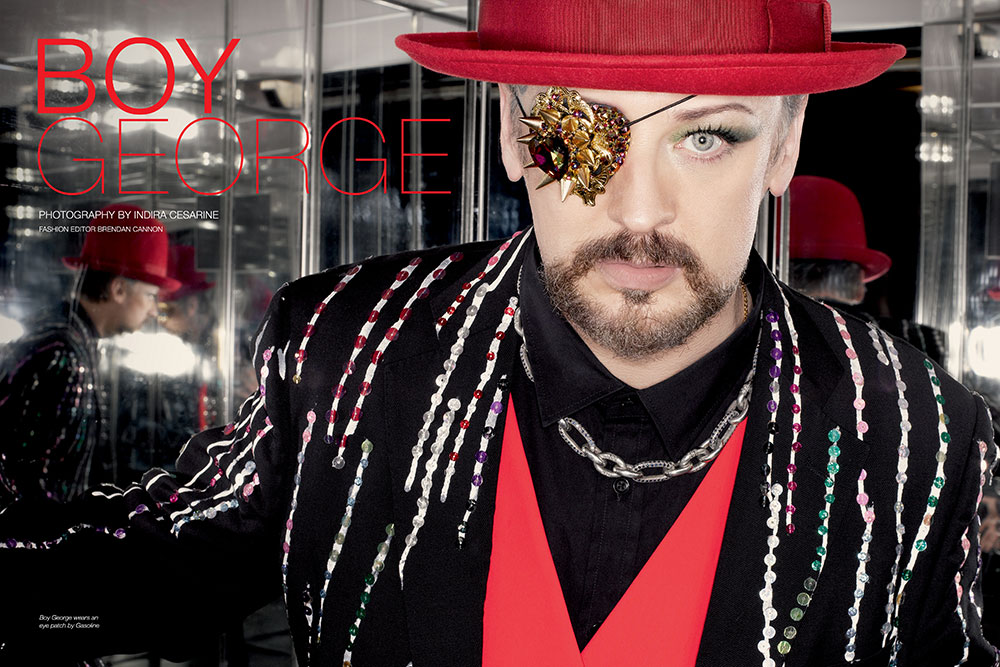
Indira Cesarine: Culture Club was one of the first multiracial pro-gay bands to have commercial success. Can you tell me about the early days of how you got the band together?
Boy George: To be fair to the rest of the band, they were kind of forced to be pro-gay because of me! It was, for them, by default because I was such a powerful character, and I used up everything that I wanted to do. But in terms of being a multicultural band, it was growing up in South East London. There were a lot of Jamaicans and Indians — that was kind of normal for us. We always had Jamaican music and Indian music, so when we got the band together, we didn’t really think of those things. Looking back it’s easier to see, because you see the bands around that time as either black or white, but we didn’t grow up with those kinds of restrictions. It was just an unconscious thing that we did.
IC: The diversity wasn’t really thought through, it just happened to be the situation that you were in?
BG: Yeah, we were used to it. Growing up, my father was a builder. So getting up in the morning and going to school — it was like The United Nations in our kitchen! Jamaican guy, African guy, people who were doing labor for my father. I grew up around that, and my parents were very, strangely, open-minded. We never grew up around any kind of racism or anything like that: it wasn’t in our lives. We were very lucky to not have any of that. By the time that I was a teenager, it was second nature to me to be in a band with whoever could play – it wasn’t about the color. That was something that other people thought we did.
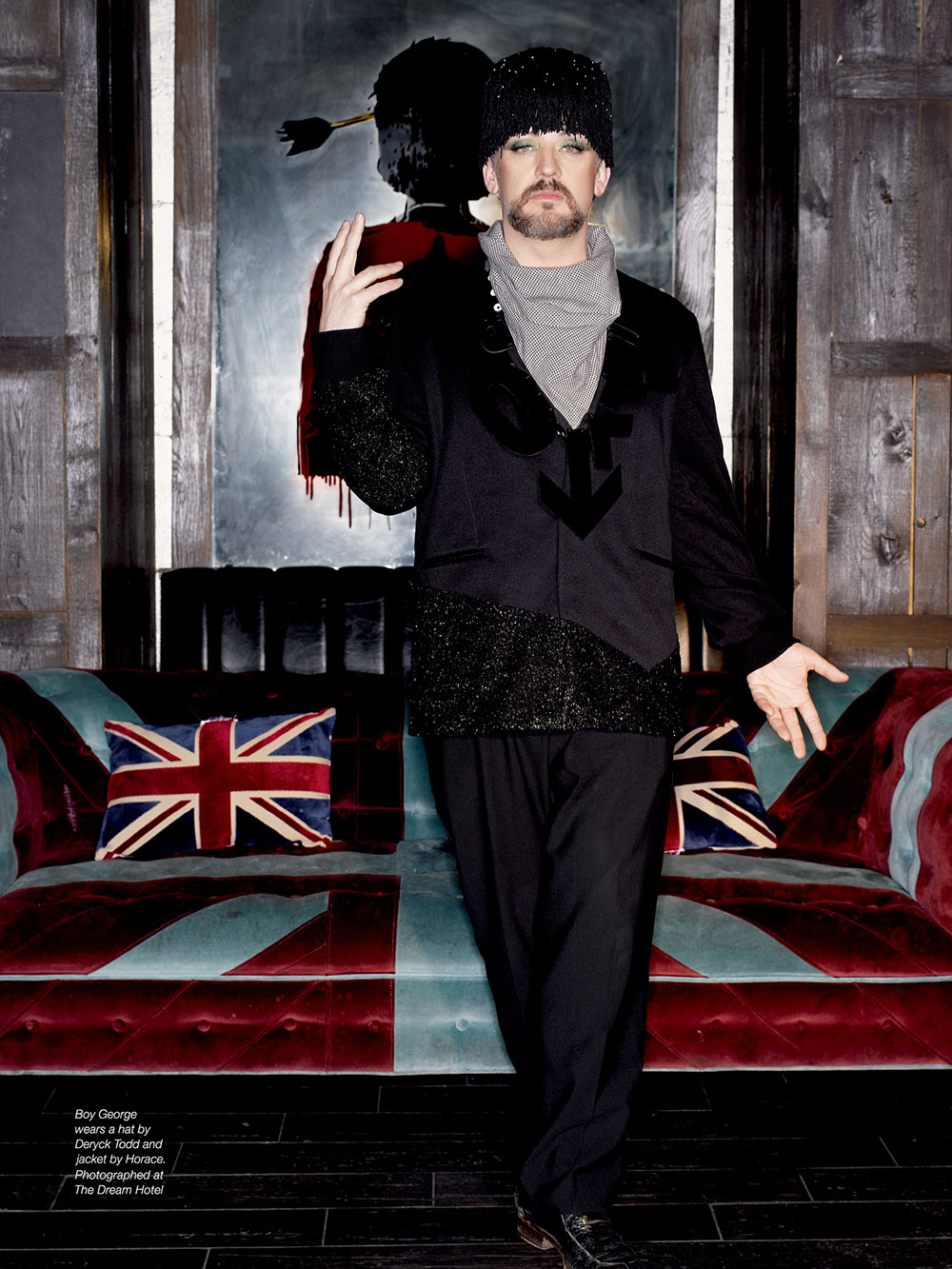
IC: And how did you come up with the name Boy George?
BG: We had some photographs done of the band, and John took a photo to a record label and they said ‘Oh great, who is the girl?’ John was like ‘Oh no, that’s George!’ In fact, before the band got famous, John had a picture of me that he kept in his room. His mother thought that I was a woman. The first time that I met her, she opened the door and when she realized, she just couldn’t hide her shock.
IC: Where did the inspiration come from for your look and style?
BG: I think when I saw Bowie when I was eleven years old — right before my birthday — I saw Ziggy Stardust, which was a life-changing moment for me. Then, people like flamboyant rock stars, and my older brother, who was a hipster as well. He’s a couple years older than me and he was working, so he had kind of trendy clothes; he wore a lot of unisex clothes. That was the fashion in the 70s for boys and girls, so I would often borrow a lot of his stuff. And, of course, movies: Liz Taylor, Carmen Miranda… I grew up watching that stuff. Anything exotic, really. I think it was in my genes.
IC: What were the musical influences that you had for Culture Club?
BG: Everyone in the band had different musical taste, and we somehow managed to put it into one band. Everyone who starts a band has some sort of idea of what they want to be. I certainly had a very different idea about what Culture Club was going to be, and it became something completely different than what I was planning it to be. I was planning on becoming goth. With the other guys coming into the band, it quickly developed into what it was going to be. Not one person really influenced the sound that much; everyone just threw their ideas into the pot and somehow, it came out sounding like it did.
IC: Do you remember your first performance with Culture Club?
BG: I remember singing with the audience for quite a large chunk of the show. I was quite mouthy and confident, but when it got to being on stage, I was like ‘I don’t want to look at anyone!’ After the show, the guys in the band were like ‘Maybe you need to look at the audience next time.’ I was just a bit like ‘Oh my god,’ because it’s a whole different thing to think of doing it, and then being on stage and people are staring at you – I found it really difficult.
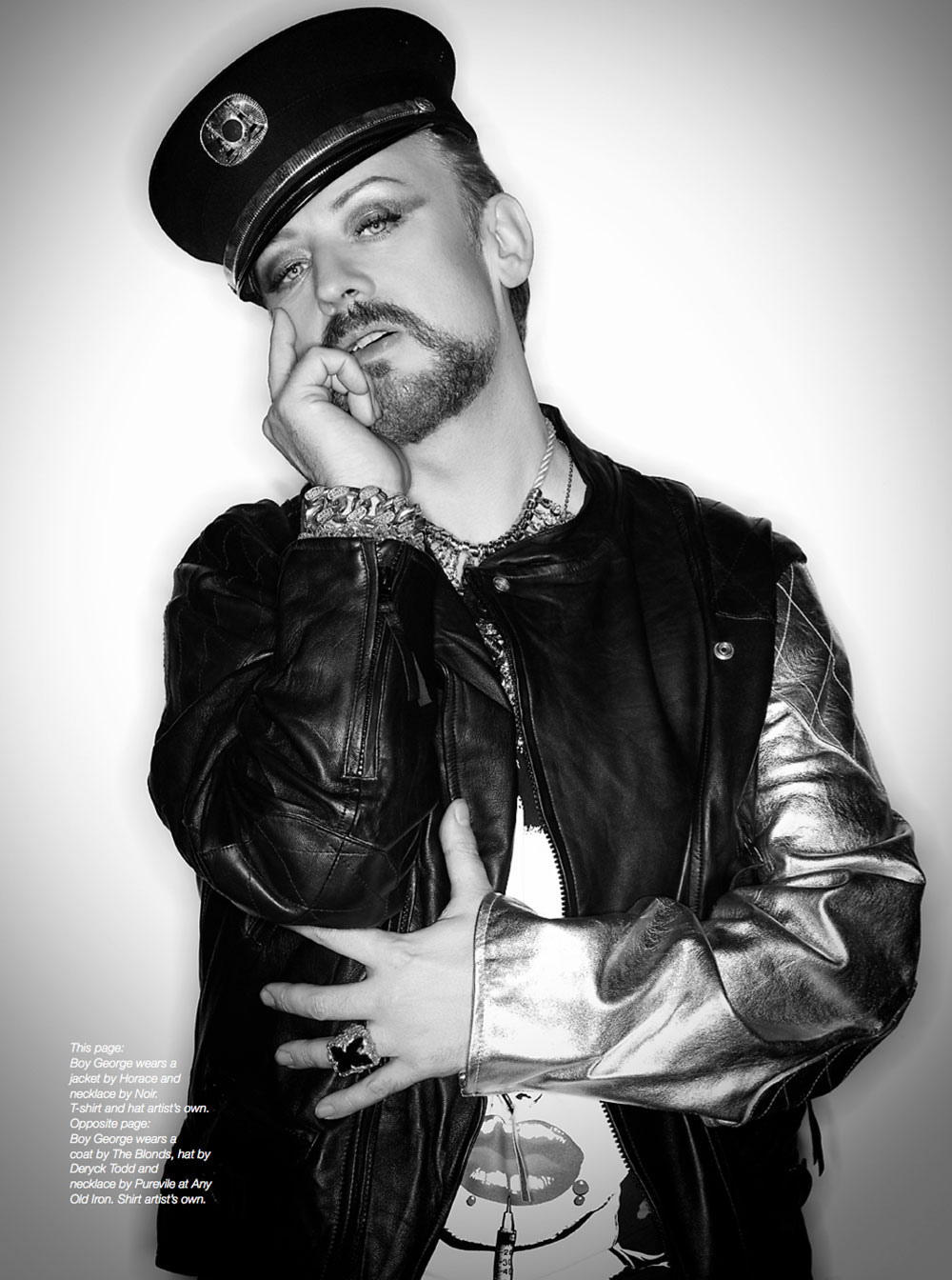
IC: The band’s debut album won a Grammy and had back to back number ones. How did you feel about the impact that your music was having? Were you even conscious about how enormous it became overnight?
BG: It was kind of unbelievable, it happened so quickly. One minute we were normal people, and the next minute we were flying all over the world, winning awards, having people screaming at us. Of course it’s a hoot, going to Australia and having four thousand people screaming and you feel amazing. But after a while, it sort of becomes a little bit of a prison, because it’s fun to start with, but then you look outside of your house and there are always people there. It’s kind of like, this isn’t fun anymore. To start with, of course it was amazing. I think the best kind of fame is one that comes with an off button. Unfortunately, they haven’t made that yet, where you can go ‘Oh I’m done now *click*!’ At a certain point it became unbearable, really. You couldn’t go anywhere without people bothering you, and taking your picture. I think, in a way, being famous can be a job in itself. For us, specifically for me, it got in the way of everything that I did creatively. Being Boy George — this sort of celebrity — was a full-time job.
IC: It was such an identifiable look that you had, you must’ve been overwhelmed.
BG: When you’re younger, you really don’t know when to say no. It’s all happening around you, and you feel that if you don’t do it, it’s all going to fall apart. I didn’t want to stop, or else people would forget who I was. I think that the sensible people, the clever ones, take time off. They go on holiday for a year. We just didn’t know how to do that; we weren’t good at doing that.
IC: Are you still working with any of your bandmates from Culture Club now?
BG: We are going to do a record. Right now I’m working on my own record, and I’m about to go do a tour in America. The next project, either at the end of this year or the beginning of next year, will be a Culture Club record.
IC: That’s exciting!
BG: It is exciting! We’ve been writing already so we’re slightly prepared. We’re still working on songs, but we’re definitely going to do it.
IC: What inspired you to go back into the studio? Tell me about the new album.
BG: I just felt it was time. I’ve been DJing, very happily, for the past twenty-five years. It’s been an amazing second career for me, but I just started to miss playing. I started to miss gigging and doing albums and I suppose that I’ve come back to my work with a renewed passion.
IC: What’s the inspiration behind the title, “This is What I Do“?
BG: Well I’ve done a lot to distract people from what I do. Probably some wonder ‘What do you do?’ So it was my way of making a statement and reminding people. I felt like it was time to be a bit more on top of things and more professional. I’m very lucky to do what I do. I have a job that I love and get paid for, which is amazing. It took me a long time to get to this point where I feel like I’m very lucky.
IC: You’ve made a lot of lifestyle changes over the years as well. I understand that you’re now vegan and sober. Why did you make these changes?
BG: I think that getting older, falling apart a little bit…I’m fifty-two. Tomorrow marks the sixth year of my sobriety. My life was spiraling out of control, and I needed to do something about it. I needed to make those lifestyle changes–there was no other option. It was either the elevator is going up or going even further down. I chose to go up to the penthouse.
IC: Has that affected your music or your career, making those choices?
BG: Absolutely. I’m 100% more professional, and I think I’m better at what I do. Being sober can only make things better; it’s a life changing kind of thing. I would say that everything has improved. There’s no comparison, really. I enjoy what I do in a way that I never could before, and that’s a great thing.

IC: You have your tour coming up with a nine-piece band. What is the plan for the performance? Are you going to be mixing in some old hits or is it going to be your new music?
BG: We always do a mixture of the new album and classic hits; also some new things that people haven’t heard. You want to make sure that you don’t bore the pants off of people, so you want to try and strike a pretty good balance between giving people things they know and keeping it interesting for yourself. You always want to make sure that the audience goes home with a smile on their face. We’ll balance it as perfectly as we can!
IC: You mentioned before that for twenty-five years, you’ve also had a sideline as a DJ. Can you tell me what kind of music you played, and what sort of artist that you look for in a DJ?
BG: The kind of dance music that I’m involved in is much more underground than the stuff you’re hearing on the radio. I don’t play EDM – I know that’s a more current term. Things like the English artist Breech and Disclosure and things like Monica Cruz. A lot of the stuff that I play, unless you go to the clubs, isn’t going to make any sense because it’s tech-house techno–it’s not very pop. It’s been a great thing for me, because it’s meant that I don’t have to rely on culture: being involved in the underground scene has allowed me to stay current and kept me away from that nostalgic route of what I used to do in the 80s.
IC: What do you think of today’s music versus that of the 80s?
BG: I think there is always really great music being made. Always. Music is such a personal thing and I don’t always understand what’s popular. I’m sure people felt the same about me in the 80s. I’m sure people thought ‘What the hell is this?’ I’ve always liked all kinds of music, from rock to country to jazz. I’ve got very great taste because I’m a Gemini, and I love all kinds of music. For me, at the moment, a lot of pop music sounds similar and plain. A lot of it just sounds like the same producer has made it. I’m told that there is a team of producers in Sweden that pretty much do everything, so, that’s why it all sounds the same. I think that there’s not enough individuality in today’s music, but I think it will all change. I’m always optimistic, I’m always thinking that things will get better. The younger generation will take control and they’ll do really interesting, radical things, and I can’t wait for that to happen.
IC: Obviously, you have the artists that you like to play as a DJ. Are there any other artists that inspire you now as a musician?
BG: A lot of the people that inspire me are the old ones like the Dylans and the Joni Mitchells and, of course, Bowie. A lot of my favorite music is from the 70s so I’m always kind of referring to that period: The Beatles, John Lennon, then also The Stones. I’m a bit vintage.
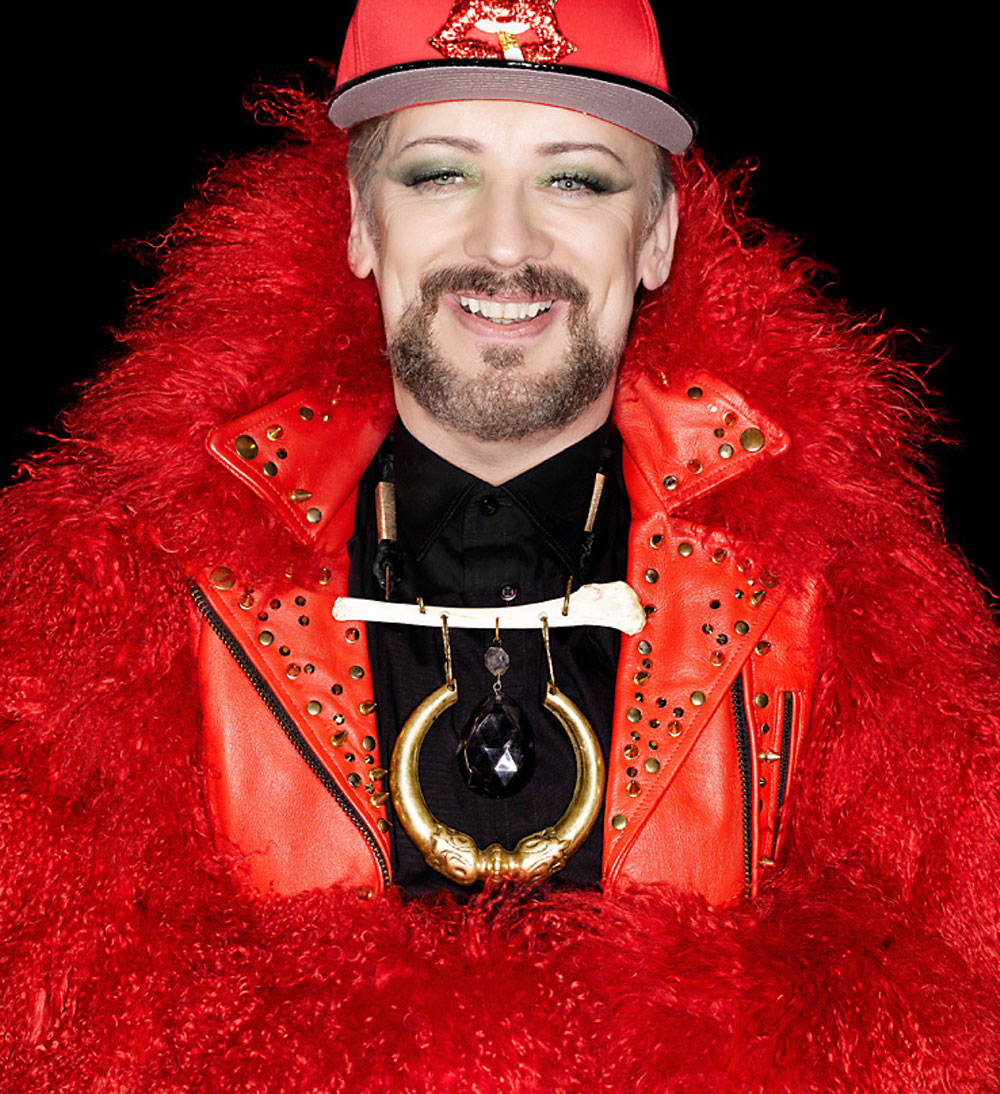
IC: Looking back at your career, is there anything that you would’ve done differently?
BG: Oh god, everything! The main thing that I would’ve done differently is that I would’ve had much more fun. I would’ve breathed a bit deeper, I would’ve allowed myself to enjoy what was happening. I would’ve caused less drama, absolutely. I would’ve loved with more confidence. You don’t get the chance to go back, but I think if I’ve learned anything from any of that, it’s that time is precious, and if you travel, you should really try and experience the places that you go; look around more, listen more, enjoy it.
IC: Do you have a personal motto or words of wisdom that you live by?
BG: Well, I love a quotation. My favorite thing that I’ve heard recently is ‘Like prostitutes and monuments, if you stick around long enough, you’ll get respect.’ I feel like somehow I fit into that.
IC: Are there any other major projects we should look out for this year?
BG: I have more things up my sleeve. I have tracks that I’ve done with Roger Sanchez, he’s a very super cool DJ. We’ve got this track called “Hold On” which is uber cool. It’s not a pop record, but it’s really a great dance jam.
IC: Is that a separate thing from the album that you’re doing?
BG: It’s an entirely separate thing, yeah.
IC: Who have you collaborated with on your new album?
BG: On this record, we recorded around a few people: a guitarist called Ali from Texas; we also had a girl come and play harmonica. We just finished some dance records that should be coming out in America soon.
IC: This is our “Legendary” issue. When you hear the word legendary what do you think?
BG: I think it’s people like Bowie! It’s not a word that you could use to describe yourself. I don’t think it would be very… you just couldn’t say that about yourself, it’s not a cool thing to do! It’s like playing your own music and dancing to it! For me, it’s people that resonate no matter where or when–someone who continues. Someone who you just think ‘Wow, what a great attitude.’ That’s also what makes someone legendary, when you think of that person, you have a definite idea of what they look like and what they’re about and their energy. So, that’s the best I could say about myself is that I hope to become one of those people.
Interview and photography by Indira Cesarine for The Untitled Magazine
Styling by Brendan Cannon
Photographed at The Dream Hotel
See the exclusive behind the scenes video with Boy George and be sure to check out The Untitled Magazine‘s “Legendary” Issue 7 here!
This article originally appeared in The #Legendary Issue of The Untitled Magazine (2014).



